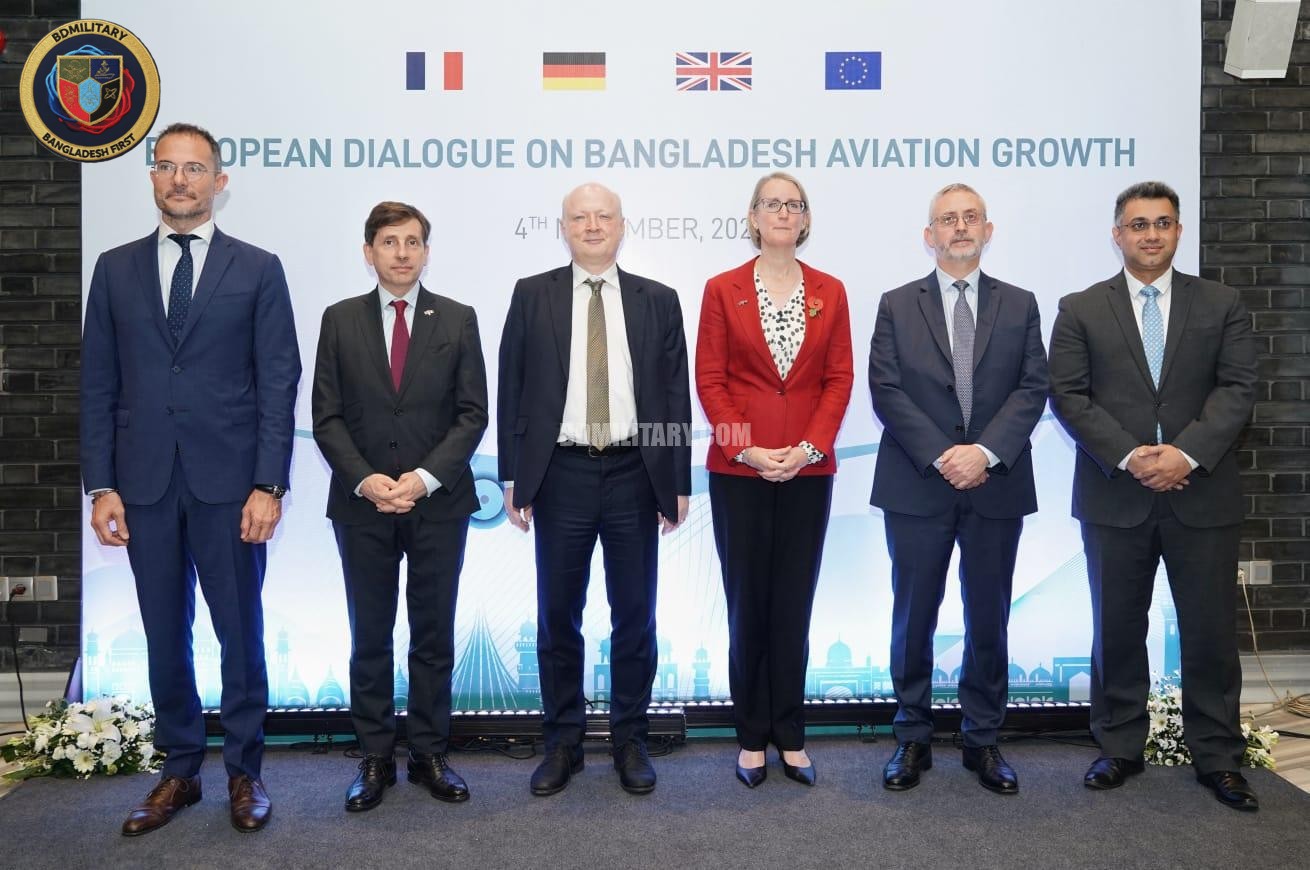Ambassadors and high commissioners from France, Germany, the United Kingdom and the European Union have voiced unified support for introducing Airbus aircraft to Biman Bangladesh Airlines’ fleet, underscoring Europe’s commitment to strengthening Bangladesh’s aviation sector.
Speaking at an event titled “European Dialogue on Bangladesh Aviation Growth”, held today at the Franco-German Embassy in Dhaka, the diplomats highlighted that integrating Airbus aircraft alongside Biman’s existing fleet would enhance the national carrier’s operational flexibility, resilience and long-term competitiveness.
Jean-Marc Séré-Charlet, Ambassador-designate of France, stated that Bangladesh’s strategic location and expanding connectivity needs position it to become a regional aviation hub. “In this context, Airbus has presented a comprehensive and competitive solution to Biman Bangladesh Airlines to support this transformation,” he said.
He added that the Airbus proposal enjoys strong backing from all four European nations involved in the multinational consortium, noting that their respective export credit agencies had already expressed readiness to support the deal. “As Bangladesh emerges as a key aviation player in the region, Europe stands prepared to accompany this journey through Airbus,” Séré-Charlet affirmed.
German Ambassador Rüdiger Lotz emphasised the need for modern and environmentally sustainable aircraft as Bangladesh’s economy and middle class continue to grow. “Biman requires a new generation of aircraft that are efficient and future-proof. Airbus is well positioned to meet that requirement,” he noted.
British High Commissioner Sarah Cooke reiterated the United Kingdom’s continued support for Bangladesh’s economic ambitions and its aspiration to evolve into a regional aviation hub.
EU Ambassador Michael Miller echoed similar sentiments, stressing the European Union’s broader objective of reinforcing trade and industrial partnerships with Bangladesh.
According to the French envoy, France and its European partners are committed to establishing a long-term collaboration to develop Bangladesh’s wider aviation ecosystem. This includes investment in pilot and engineer training, maintenance and repair operations, and the transfer of industrial expertise — all aimed at enhancing Biman’s operational capability and human resource development.
Airbus representatives also delivered a presentation outlining Bangladesh’s aviation growth potential and reaffirmed the company’s continued engagement with Biman and the Government of Bangladesh.
Background
Bangladesh has already made a significant commitment to the United States by agreeing to purchase 25 new passenger aircraft from Boeing, a deal announced earlier this year as part of Dhaka’s broader effort to narrow the bilateral trade deficit with Washington. The procurement, estimated to be worth several billion dollars, includes a mix of Boeing 787 Dreamliners and 737 MAX aircraft intended to modernise Biman’s fleet and meet future route expansion needs.
The decision to opt for Boeing at the time was also linked to geopolitical and economic considerations — notably, to strengthen trade ties with the United States amid increasing export imbalances in garments and other sectors. In return, the U.S. has expressed interest in expanding investment in Bangladesh’s aviation safety, logistics, and air traffic management infrastructure.
However, industry analyses — including recent assessments by the Centre for Aviation (CAPA) and Bangladesh Institute of Development Studies (BIDS) — have suggested that Airbus aircraft could prove more expensive to operate and maintain for Biman, primarily due to the airline’s existing infrastructure being optimised for Boeing platforms. The studies noted that the introduction of Airbus models would require new ground equipment, additional crew training, and expanded maintenance capabilities, adding considerable upfront and operational costs.
Despite these challenges, proponents argue that a diversified fleet would reduce dependency on a single manufacturer and allow Biman to access competitive financing and leasing options from multiple markets. If careful planning is undertaken and those plans are executed properly, Biman and its passengers stand to benefit from improved operational flexibility, route expansion, enhanced service quality, and long-term resilience.
However, current governance and management issues, including entrenched cronyism and corruption within Biman, make it unlikely that the airline will be capable of fully leveraging such opportunities without significant reforms. Past inefficiencies in decision-making, procurement, and operational oversight suggest that ambitious fleet diversification plans could falter unless systemic changes are implemented.
Assessment
The strong and coordinated European diplomatic support for Airbus indicates a broader strategic intent by the European Union to deepen engagement with Bangladesh across civil and dual-use aerospace domains. For Dhaka, balancing fleet diversification with fiscal prudence will be crucial. While the Airbus proposal offers opportunities for training, industrial cooperation, and maintenance capability development, Biman must overcome significant internal governance and corruption challenges to fully realise these benefits. Without substantive reforms, the airline risks being unable to capitalise on the potential operational, economic, and strategic advantages of a diversified fleet — highlighting that modernisation must go hand-in-hand with structural accountability.


